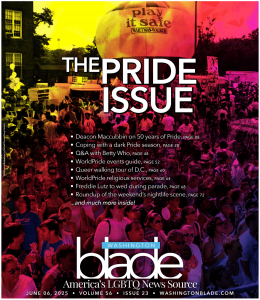
Pride ad spending down due to anti-DEI, fewer int’l tourists
by Joe Siegel
As growing numbers of international tourists are shunning visits to the United States due to the Trump administration’s authoritarian immigration crackdowns and rolling back LGBTQ rights, the impact on LGBTQ media organizations has been severe.
Several corporations have either cut back funding for various Pride festivals, or withdrawn their support completely due to the administration’s anti-DEI (Diversity, Equity, and Inclusion) policies.
According to NBC News, “The organizers of several of the country’s premier Pride celebrations told NBC News they have also lost funding from corporate sponsors this year, to the tune of $200,000 to $350,000 each. For some larger organizations — like those in New York City and San Francisco — the shortage makes up about 10 percent of their total Pride event budget, while for others, like St. Pete Pride in Florida, it could be about half.”
Los Angeles-based The Fight, for one, is fighting back. “Our strategy involves a heightened emphasis on several key areas: first and foremost, our local LGBTQ+ community centers and organizations; secondly, LGBTQ+-owned businesses within our area; and finally, and crucially, strengthening our ties with our allies, underscoring the vital importance of their support at this time,” said Mark Ariel, the magazine’s managing editor.

“Pride sponsorships are one thing as we either have all the bells and whistles or have just a march,” said Todd Evans, CEO of Rivendell Media (which publishes Press Pass Q). “However, LGBTQ media is a business and it is mostly available free to consumers, so if advertising is down — and national advertising is down this Pride — then there is less coverage our media can do for and about our community.”
Evans believes businesses that embrace the LGBTQ community will benefit as a result. “I can tell you that I do feel there is a pent up demand for companies [that are] standing up for American values, of which diversity is a big part of that, and whatever company does, they will reap the rewards like no other.”
Cynthia Laird, news editor of the Bay Area Reporter in San Francisco, isn’t worried about fewer tourists.
“People will pick up the paper if they are in town and/or read us online,” Laird said. “There may be fewer LGBTQ people traveling due to the Trump administration’s policies surrounding passports and visas. San Francisco International Airport recently announced it expects traffic growth to increase for the summer season, which begins in late May, but, as we know, LGBTQ travelers, especially trans people, may not be part of that, especially those from abroad.”
Far more concerning, Laird added, “is the dip in advertising that is expected for June and our Pride issue of June 26. I attribute that to the Trump administration’s war on DEI — and some national companies, universities, and others falling in line by rescinding their own diversity policies and outreach. Additionally, President Donald Trump’s trade war has left many advertisers unsure of when to advertise or how to plan for any advertising campaign. Already, we have reported that several corporate sponsors have withdrawn from San Francisco Pride this year, and that is expected to hurt the SF LGBT Pride Celebration Committee that puts on the event. There’s a trickle down affect to local LGBTQ media if those same companies aren’t advertising in the queer press.”
Some outlets are still thriving, despite the setbacks.
“Our annual Pride Guide was published last [month] with a record number of celebrations all across the state, including three inaugural events,” said Ken Schenck, editor of The Buckeye Flame, based in suburban Cleveland. “We’re seeing an increase in opportunities for LGBTQ+ Ohioans to gather to be their authentic selves, in familiar locations like Cleveland, Columbus and Cincinnati, to rural communities that are providing a safe space for their local LGBTQ+ neighbors.”
The Buckeye Flame reported that Cincinnati Pride “has announced it will sever ties with some corporate sponsors following widespread rollbacks in [DEI] programs. Ultimately, Cincinnati Pride said its decision to shift corporate sponsorship guidelines has cost them ‘tens of thousands of dollars.’ In place of larger corporate funders, the group will pivot to a community-based funding model that better serves its mission and values, mostly depending on small, personal donations from thousands of supporters.”
Schneck noted Cincinnati Pride has “almost completely made up the difference via community contributions.”
Still, some editors are apprehensive about what the future holds for LGBTQ media.
“The bottom line: this is really the moment of truth,” said The Fight’s Ariel. “We’ll see who’s genuinely got our backs and who was just going through the motions. Things are getting real, like, really real, fast.”
TOP STORY
Volume 27
Issue 4








